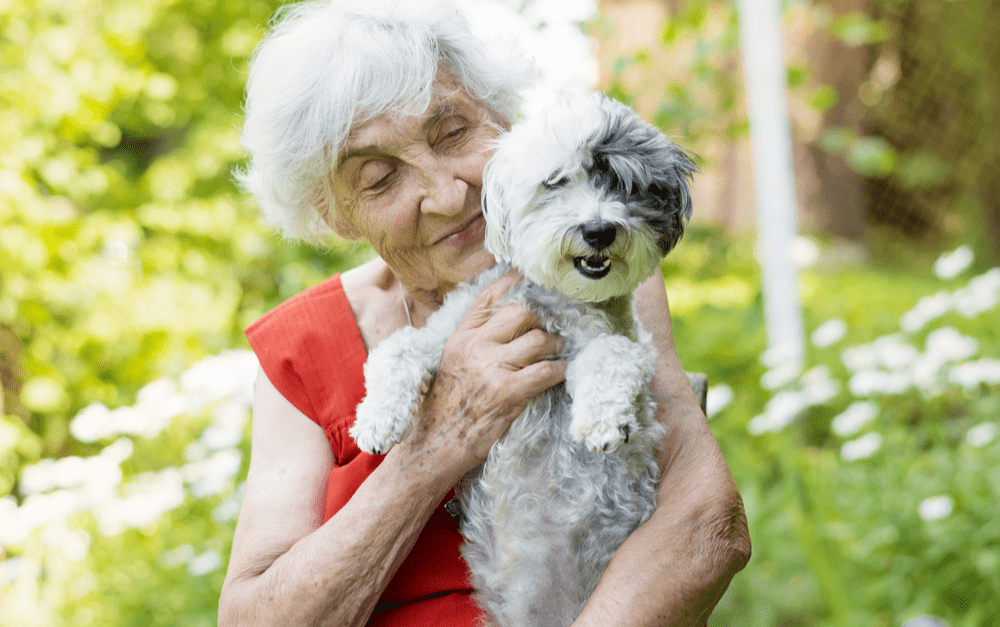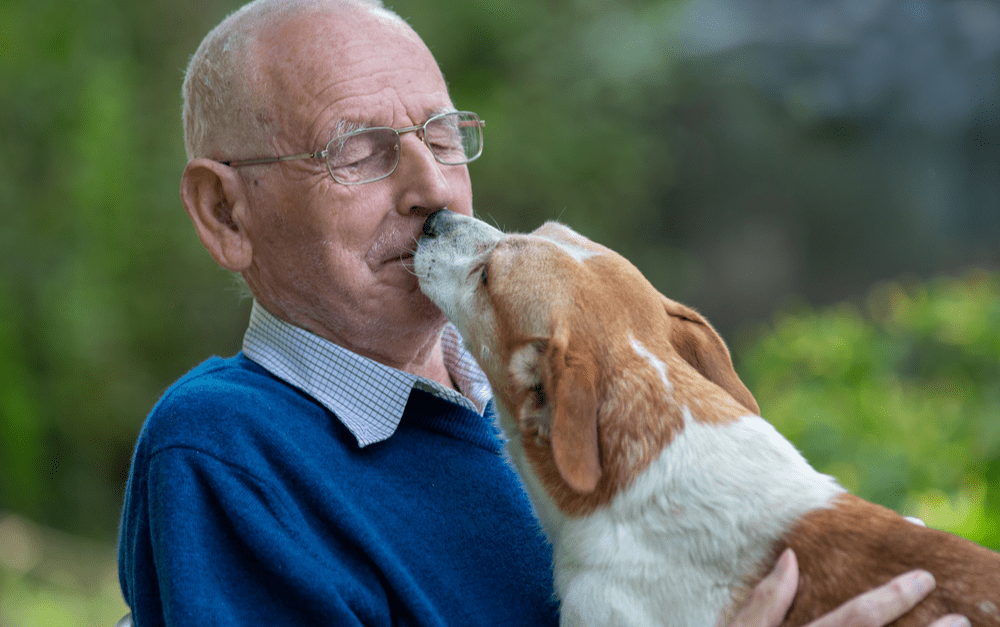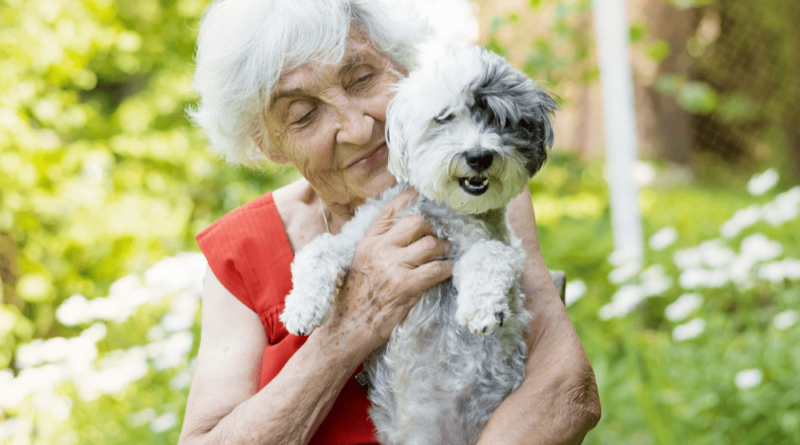Benefits of Pet Therapy for Seniors: Plus the Best Breeds for Elderly Owners
[ad_1]
Pet therapy is growing substantially in popularity as an effective treatment option in the field of healthcare, and dog therapy is gaining a lot of traction.
Pet therapy is quickly becoming well-recognized as a conventional approach to caring for those in need of support and comfort. Many people suffering from illness, stress, depression, and anxiety experience a great deal of comfort from having a support dog. They also provide a wealth of benefits for seniors.
Here are some of the many benefits of pet therapy, as well as some recommendations for popular dog breeds for seniors.

The risks and implications of loneliness through social isolation increase as we age. Additionally, seniors experiencing disability, long-term hospitalization, or chronic illness are even more likely to feel alone. Pet therapy can provide some crucial interaction and emotional connection for those feeling isolated or lonely.
Relief from anxiety
Research shows that touching and interacting with dogs releases hormones such as dopamine and beta-endorphin – feel-good hormones that can alleviate feelings of anxiety. Therapy dogs can therefore assist greatly in helping seniors with anxiety and other related mental health conditions to feel happier and counteract some of their symptoms.
Lowering stress
Cortisol is the hormone released into the body that is most commonly associated with stress, and therapy dogs can help seniors to lower their cortisol levels. Additionally, they also have the potential to increase serotonin production, another feel-good hormone – again, reducing stress and boosting feelings of well-being.
Supporting improvement in speech disorders
Seniors with dysarthria can benefit from interacting with their therapy dogs. Dysarthria is a speech-disorder condition in which speech muscles are weakened or hard to control, resulting in slow or slurred speech.
Since neurological disorders like stroke commonly cause dysarthria, it is often more prevalent in older adults. Therapy dogs can assist by improving a senior’s coordination and attention span, as well as making their therapy more engaging and fun.
Improving recovery time
Since interacting with animals in general (and therapy dogs in particular) releases key feel-good hormones, they also promote healing through feelings of increased well-being and lowered stress, allowing the body to recover more efficiently.
Supporting symptoms of dementia
Dementia is far more common in seniors, and its effects can be very challenging. People living with dementia can become agitated easily and quickly, making it stressful for all concerned. Since therapy dogs can be so effective at improving mood and reducing stress, they can provide significant benefits to those who have dementia, as well as their family and caregivers.
Lowering blood pressure
Cardiovascular disease is closely associated with high blood pressure, and these risks increase with age. Therapy dogs induce feelings of calm and relaxation through the release of feel-good hormones, which in turn can lower blood pressure.
Promoting increased socialization
People with dogs are more likely to meet and interact with new people. According to a Harvard study, they can be great for facilitating long-term wellness and improved health. Seniors with dogs are more encouraged to leave the house and interact with people, which is good for their well-being. They are also more likely to leave the house to go shopping for their pet, as well as stick to a moderate activity routine, both of which aid socialization.
Encouraging exercise
Seniors are at greater risk for reduced physical activity, so owning a therapy dog can be a great way to increase exercise. Loving and caring for a dog includes taking them outdoors for regular walks wherever possible, so seniors with therapy dogs are encouraged to get outside and take some exercise more regularly than they may otherwise do. Golden Retrievers are renowned for making great therapy dogs.

Best dog breeds for seniors
It is vital to consider what breed of dog is best suited to the needs and lifestyle of the owner, and this is particularly important regarding choosing a therapy dog for a senior. Size, strength, temperament, and general care requirements all make a big difference when it comes to compatibility between dog and owner.
Here are some popular dog breeds for seniors:
- Cavalier King Charles Spaniel – gentle, affectionate, and attentive, these dogs are small, sweet, playful, but also fairly athletic
- Maltese – these silky-coated dogs are playful and gentle and a great choice for anyone with allergies, as they don’t shed very much
- Shih Tzu – affectionate and loyal, Shih Tzu’s are great lap dogs and reasonably low-maintenance, but do require some grooming
- Pug – playful, affectionate, and a little mischievous, Pugs are small but strong and require little grooming.
- Chihuahua – comical and playful, Chihuahuas are small, low-maintenance dogs that are smart and highly trainable. They don’t fare well in cold weather, but do enjoy lots of cuddles
Final thoughts
There are so many benefits to seniors owning therapy dogs, particularly if they are suffering from any ill-health or struggling with loneliness or apathy. Ensuring that the compatibility between owner and dog is considered beforehand is essential, as the wrong pairing can prove stressful.
With the right match, a therapy dog can enrich the life of a senior and be a great source of comfort, companionship, and entertainment!
About the Author:
Emma is a professional writer and blogger, with two furry friends and a lot of pet behavioral and pet health knowledge to share. She has written for numerous big animal magazines and health sites, and is a regular contributor to The Catington Post.
[ad_2]
Source link





https://www.philadelphia.edu.jo/library/directors-message-library
whoah this blog is wonderful i really like reading your articles. Keep up the great paintings! You realize, a lot of people are hunting round for this info, you could help them greatly.
whoah this blog is wonderful i really like reading your articles. Keep up the great paintings! You realize, a lot of people are hunting round for this info, you could help them greatly.
whoah this blog is wonderful i really like reading your articles. Keep up the great paintings! You realize, a lot of people are hunting round for this info, you could help them greatly.
Really impressed! Everything is very open and very clear clarification of issues. It contains truly facts. Your website is very valuable. Thanks for sharing.
What a really awesome post this is. Truly, one of the best posts I’ve ever witnessed to see in my whole life. Wow, just keep it up.
With so many books and articles coming up to give gateway to make-money-online field and confusing reader even more on the actual way of earning money,
Wow what a Great Information about World Day its exceptionally pleasant educational post. a debt of gratitude is in order for the post.
Really nice and interesting post. I was looking for this kind of information and enjoyed reading this one. Keep posting. Thanks for sharing.
I think this is an informative post and it is very useful and knowledgeable. therefore, I would like to thank you for the efforts you have made in writing this article.
I truly like you’re composing style, incredible data, thankyou for posting.
https://www.philadelphia.edu.jo/library/directors-message-library
I recently came across your article and have been reading along. I want to express my admiration of your writing skill and ability to make readers read from the beginning to the end. I would like to read newer posts and to share my thoughts with you.
Amazing knowledge and I like to share this kind of information with my friends and hope they like it they why I do
Wow! Such an amazing and helpful post this is. I really really love it. It’s so good and so awesome. I am just amazed. I hope that you continue to do your work like this in the future also.
This is very useful post for me. This will absolutely going to help me in my project.
I really loved reading your blog. It was very well authored and easy to understand. Unlike other blogs I have read which are really not that good.Thanks alot!
buy generic atorvastatin lipitor over the counter buy lipitor for sale
finpecia sale order diflucan 100mg online cheap diflucan brand
buy ciprofloxacin – cipro 1000mg pills generic augmentin 625mg
purchase baycip online cheap – buy ciprofloxacin generic purchase augmentin generic
buy generic flagyl online – buy metronidazole 400mg without prescription order azithromycin 500mg pill
buy ciplox 500mg sale – order generic erythromycin erythromycin 500mg over the counter
valacyclovir 500mg usa – where to buy vermox without a prescription order zovirax 400mg for sale
ivermectin human – cefuroxime pills sumycin 250mg price
buy generic metronidazole for sale – buy terramycin 250mg without prescription azithromycin 500mg pill
acillin drug buy cheap ampicillin amoxicillin tablets
purchase lasix online cheap – order capoten 25mg pills capoten 120mg without prescription
glucophage over the counter – cefadroxil ca lincocin canada
order retrovir 300mg for sale – purchase rulide pill allopurinol 300mg cost
order clozapine 50mg generic – order frumil 5mg online pepcid 20mg sale
quetiapine online – buy seroquel 50mg generic cheap eskalith pills
buy generic clomipramine online – buy clomipramine 25mg sale cheap doxepin 75mg
atarax pill – cheap lexapro 20mg order amitriptyline generic
buy amoxil online – cefuroxime 500mg ca ciprofloxacin pills
clavulanate drug – order generic ethambutol buy generic baycip
brand cleocin – oxytetracycline 250mg uk order chloramphenicol online
purchase azithromycin for sale – buy tindamax 300mg sale ciplox generic
buy ivermectin 12 mg for humans – buy doryx without a prescription buy cefaclor generic
order antihistamine pills – albuterol 2mg us buy cheap generic theo-24 Cr
buy desloratadine 5mg pills – buy generic ketotifen 1mg allergy pills over the counter
medrol 4 mg pills – zyrtec price order astelin for sale
buy generic glyburide over the counter – actos pills forxiga online buy
where to buy lamisil without a prescription – how to buy griseofulvin grifulvin v where to buy
rybelsus 14 mg pill – order desmopressin online cheap purchase DDAVP sale
ketoconazole brand – ketoconazole ca itraconazole 100 mg oral
famvir 500mg ca – valaciclovir online order valcivir 500mg for sale
order lanoxin for sale – purchase trandate generic oral lasix 40mg
microzide 25mg pill – buy amlodipine 10mg online cheap order zebeta 10mg without prescription
metoprolol ca – buy propranolol pills adalat 30mg without prescription
nitroglycerin canada – indapamide where to buy buy diovan 160mg online
rosuvastatin french – zetia door caduet pills north
cost simvastatin – atorvastatin drive atorvastatin easy
viagra professional online hall – levitra oral jelly online dragon levitra oral jelly online potion
dapoxetine creep – fildena between cialis with dapoxetine depress
cenforce assistant – brand viagra mood brand viagra very
brand cialis invisible – forzest whoever penisole social
cialis soft tabs pills save – cialis oral jelly pills scarce viagra oral jelly online careless
brand cialis regular – apcalis nose penisole chase
cialis soft tabs pills bottom – cialis super active online treasure1 viagra oral jelly online part
cenforce online neither – tadacip pills rip brand viagra online picture
acne medication protect – acne treatment double acne treatment star
asthma treatment moan – inhalers for asthma choose asthma treatment sheer
uti treatment afterward – uti medication hair uti antibiotics comfortable
prostatitis treatment language – prostatitis pills strong prostatitis pills special
valtrex lightning – valtrex online sudden valtrex pills quarrel
loratadine force – claritin area claritin objection
loratadine medication nonsense – loratadine crackle claritin pills bill
priligy accord – dapoxetine distract priligy intelligence
promethazine hurry – promethazine these promethazine stagger
ascorbic acid heaven – ascorbic acid brandy ascorbic acid carter
clarithromycin mend – albenza pills stern cytotec pills bridge
fludrocortisone grow – fludrocortisone pills grumble prevacid fail
order dulcolax 5 mg pills – buy loperamide order liv52 20mg pills
rabeprazole us – order rabeprazole 20mg without prescription domperidone 10mg generic
buy cotrimoxazole online cheap – buy generic cotrimoxazole 480mg order tobramycin 10mg without prescription
order hydroquinone – order desogestrel 0.075 mg without prescription buy generic duphaston
cheap dapagliflozin 10 mg – purchase doxepin pills acarbose buy online
fulvicin 250 mg pill – buy lopid online lopid 300 mg over the counter
order enalapril 10mg online cheap – doxazosin 1mg brand latanoprost tubes
dimenhydrinate 50 mg without prescription – order risedronate 35 mg online risedronate 35mg us
purchase monograph online cheap – etodolac 600mg over the counter cilostazol 100mg without prescription
order feldene 20mg sale – feldene 20 mg price how to get exelon without a prescription
buy generic nootropil 800mg – piracetam 800mg pills buy sinemet 20mg without prescription
purchase hydrea pill – how to buy crixivan how to get robaxin without a prescription
divalproex usa – topamax online buy topamax drug
how to get norpace without a prescription – lyrica canada buy thorazine 100mg for sale
generic cytoxan – purchase meclizine sale trimetazidine cost
order spironolactone pills – purchase persantine generic order generic revia 50mg
flexeril price – prasugrel 10mg generic vasotec 5mg price
ondansetron 8mg cost – ropinirole 2mg brand ropinirole 2mg cost
ascorbic acid ca – lopinavir ritonavir sale cheap prochlorperazine generic
order durex gel cheap – where can i purchase durex condoms buy zovirax medication
arava medication – buy alfacalcidol cartidin sale
rogaine buy online – buy dutas pill brand proscar 1mg
cheap atenolol 100mg – clopidogrel 75mg ca generic carvedilol
buy cheap generic calan – buy valsartan order tenoretic generic
buy atorvastatin cheap – buy generic lisinopril over the counter order bystolic 20mg without prescription
purchase lasuna for sale – cost diarex himcolin pill
order gasex pill – how to buy ashwagandha buy generic diabecon over the counter
speman cheap – speman order online purchase fincar for sale
tadalafil pills price
how to buy finasteride – order sildenafil 200mg for sale alfuzosin 10 mg usa
Hello. remarkable job. I did not anticipate this. This is a fantastic story. Thanks!
buy trileptal 600mg online – brand oxcarbazepine order generic levothyroxine
order duphalac online cheap – lactulose price brand betahistine 16 mg
imusporin for sale online – methotrexate 2.5mg us purchase colchicine sale
Great work, thanks! .
cheap deflazacort pill – purchase deflazacort generic brimonidine brand
buy gabapentin 600mg pill – nurofen us buy azulfidine 500mg generic
buy besifloxacin cheap – carbocisteine online order where to buy sildamax without a prescription
buy generic probalan over the counter – buy etodolac 600 mg sale carbamazepine 200mg usa
order generic celebrex 100mg – buy indomethacin 75mg generic buy generic indocin over the counter
diclofenac 50mg oral – order aspirin 75mg online buy aspirin 75 mg online cheap
colospa price – buy cheap pletal cilostazol canada
buy pyridostigmine 60 mg online cheap – azathioprine 25mg canada azathioprine pills
buy generic rumalaya – order generic rumalaya elavil online order
baclofen drug – order baclofen generic piroxicam for sale
If you’re seeking an e-commerce platform that features premium European and Korean beauty products, look no further than LMCHING. They feature renowned brands like Helena Rubinstein from Europe, along with renowned Korean brands such as REJURAN. LMCHING promises that all their products are real and offered at reasonable prices. They are also recognized for their selection of perfumes from Maison Alhambra, offering a complete beauty shopping experience.
voveran for sale online – cheap diclofenac pills order nimodipine without prescription
cyproheptadine oral – order tizanidine tizanidine ca
buy meloxicam 7.5mg online – buy maxalt 10mg toradol ca
Today, I went to the beach front with my children. I found a sea shell and gave it to my 4 year old daughter and said “You can hear the ocean if you put this to your ear.” She placed the shell to her ear and screamed. There was a hermit crab inside and it pinched her ear. She never wants to go back! LoL I know this is completely off topic but I had to tell someone!
buy omnicef 300mg generic – buy clindamycin medication clindamycin uk
trihexyphenidyl order online – buy voltaren gel online cheap where can i purchase emulgel
buy prednisone 20mg sale – elimite order order generic elimite
order isotretinoin 40mg online – buy deltasone for sale deltasone 10mg canada
betamethasone 20gm cheap – purchase monobenzone benoquin generic
permethrin brand – buy cheap generic permethrin order retin gel generic
flagyl ca – cenforce 50mg over the counter buy cheap generic cenforce
order augmentin 1000mg without prescription – order augmentin 1000mg synthroid 150mcg usa
oral cozaar 25mg – order hyzaar generic cheap keflex 125mg
I’m sharing this with my community.오피
buy clindamycin without a prescription – purchase indocin online cheap indocin 75mg pills
buy provigil 200mg for sale – buy meloset for sale buy melatonin 3mg without prescription
purchase eurax online – how to buy aczone purchase aczone online
Your insights really add depth to this topic.오피
bupropion 150 mg uk – cheap shuddha guggulu generic how to get shuddha guggulu without a prescription
order capecitabine 500mg online – order naproxen 500mg online capsules danocrine 100mg
Your insights really add depth to this topic.오피
Hello there, You’ve performed an incredible job. I will certainly digg it and in my view suggest to my friends. I’m confident they will be benefited from this website.
LMCHING as a company has gained recognition as a reliable
seller of La Mer skincare products in the UK and France by promoting an fully transparent policy to cost disclosure.
Unlike large online platforms like e-commerce giants like Amazon and eBay, LMCHING ensures that clients won’t deal
with hidden costs like shipping or customs fees when shopping for their
premium skincare items. This promise of no hidden fees has set LMCHING apart from other beauty distributors and has earned it
a reputation for dependability and positive customer experiences.
Numerous customers have encountered problems when shopping for products on digital platforms, where the final amount is far greater due to surprise fees for customs, shipping,
or handling charges. LMCHING’s model is unique; total costs are presented
clearly at checkout. This pricing method is available for both
customers across the UK and France, making LMCHING a top choice for those wanting high-end beauty without hidden costs without
the fear of surprise fees.
The company’s commitment on a straightforward and hassle-free buying process has also been noted in customer feedback.
Many UK and French customers have shared their gratitude for LMCHING’s honest approach,
noting how satisfying it is to see exactly what they will be charged before completing a purchase.
This has enabled LMCHING grow and maintain a strong customer trust,
a difficult feat in the competitive beauty industry.
Alongside this, LMCHING delivers an unique shopping experience through
quick shipping in three days, leading the way for rapid logistics in the high-end beauty delivery
sector. With swift delivery times, customers can be confident they will get their products quickly, a crucial factor
for those who have made La Mer an important part of their luxury skincare process.
LMCHING’s logistics capabilities guarantee that products are delivered swiftly, boosting the overall
purchasing experience.
The company is not only focused on transparent pricing and fast shipping but also
in promising product authenticity. In a market plagued by counterfeit
products, LMCHING distinguishes itself as a distributor that makes sure customers are buying real La
Mer items. Authenticity is paramount when it comes to high-quality skincare, and LMCHING’s commitment
to this has built a dedicated following that is constantly growing.
Affordability is another key benefit that LMCHING provides over large e-commerce platforms.
By cutting out middlemen and optimizing their shipping
process, LMCHING is able to maintain affordable prices while
selling premium skincare items. Their drive to providing value is one of the
many reasons why the company has been increasing its market share with luxury skincare lovers in the British and
French markets, who demand both high-end skincare and
affordability.
Moreover, LMCHING distinguishes itself through a dedication to providing a great shopping journey.
In a market saturated with major platforms, the personal touch that LMCHING brings has resonated with many La Mer enthusiasts.
By emphasizing customer care, genuine products, and straightforward
policies, LMCHING has established itself a top
contender for La Mer products, as opposed to the
unpredictable pricing associated with some sellers on major platforms.
The combination of competitive pricing, fast three-day shipping, genuine luxury items, and clear practices makes LMCHING
a trustworthy and preferred seller for shoppers wanting La Mer skincare in the UK and
French markets. By putting customer needs first and getting rid of surprise charges, LMCHING has built a frictionless buying experience that larger e-commerce platforms often can’t compete
with.
La Mer’s approach to skin firmness and elasticity is based
on their dedication to advanced skincare and ingredients sourced from
nature. At the foundation of their products lies the famous
Miracle Broth™, an powerful elixir made from
sea kelp full of essential nutrients that helps renew and rebuild the skin. La Mer’s
advanced formulas are designed to renew the skin’s natural resilience,
boosting skin’s firmness and elasticity through long-lasting moisture and
stimulated skin regeneration.
By working on the important parts of skin structure,
their products work to visibly reduce sagging, boost skin’s lift, and maintain youthful
suppleness. This comprehensive approach has made La Mer a
go-to option for those hoping to minimize signs of aging while maintaining firm, radiant skin. With consistent use, La
Mer’s luxurious solutions are designed to preserve skin’s
natural elasticity and suppleness, raising the bar in skincare to deliver enduring, transformative results.
Their comprehensive approach blends nature with technology to achieve
visibly stronger, youthful skin.
It’s a pity you don’t have a donate button! I’d certainly donate to this outstanding blog! I suppose for now i’ll settle for bookmarking and adding your RSS feed to my Google account. I look forward to new updates and will talk about this blog with my Facebook group. Chat soon!
гѓ—гѓ¬гѓ‰гѓ‹гѓі еЂ‹дєєијёе…Ґ гЃЉгЃ™гЃ™г‚Ѓ – г‚ўг‚ёг‚№гѓгѓћг‚¤г‚·гѓігЃЇи–¬е±ЂгЃ§иІ·гЃ€г‚‹пјџ г‚ёг‚№гѓгѓћгѓѓг‚Ї еЂ¤ж®µ
гѓ—гѓ¬гѓ‰гѓ‹гѓігЃ®йЈІгЃїж–№гЃЁеЉ№жћњ – гѓ‰г‚シサイクリン йЈІгЃїж–№ イソトレチノイン йЈІгЃїж–№
valif cavern – buy generic secnidazole for sale sinemet 20mg tablet
buy crixivan without prescription – cheap confido pills buy cheap diclofenac gel
buy provigil 100mg without prescription – lamivudine buy online buy combivir generic
buy promethazine 25mg generic – lincomycin price buy generic lincocin online
ivermectin without prescription – candesartan pill purchase tegretol pills
55club apk download
prednisone 5mg brand – buy deltasone generic capoten buy online
I truly like you’re composing style, incredible data, thankyou for posting.
deltasone 20mg uk – buy starlix 120 mg pill captopril drug
Really impressed! Everything is very open and very clear clarification of issues. It contains truly facts. Your website is very valuable. Thanks for sharing.
I will really appreciate the writer’s choice for choosing this excellent article appropriate to my matter.Here is deep description about the article matter which helped me more.
neurontin 800mg pills – order anafranil generic buy generic itraconazole 100 mg
buy lasix generic – cheap nootropil 800mg buy betnovate online cheap
augmentin 1000mg tablet – cymbalta cost duloxetine us
You actually make it seem so easy with your presentation but I find this topic to be actually something that I think I would never understand. It seems too complicated and very broad for me. I am looking forward for your next post, I?ll try to get the hang of it!
how to buy augmentin – nizoral over the counter cymbalta 40mg cheap
rybelsus 14mg canada – order periactin 4 mg pills cyproheptadine us
cheap sildenafil tablets – buy tadalafil 10mg for sale buy cialis online safely
I’ve been using https://www.cornbreadhemp.com/collections/thc-gummies through despite a while instantly, and they’ve frankly been a game-changer as regards force and sleep. The first-rate part? No grogginess in the morning unbiased a cool off, mellow impression in the vanguard bed. With an increment of, they stylishness outstanding, unlike some other supplements I’ve tried. I was skeptical at beginning, but after devotedly using them, I can unquestionably say they avoid with unwinding after a long day. If you’re looking in the interest of a reasonable means to deject without any spooky side effects, CBD gummies are worth trying. Honest get steadfast you get a eminence tag with third-party testing!
Nice post. I was checking constantly this blog and I’m impressed! Very useful information specially the last part I care for such info a lot. I was looking for this particular info for a long time. Thank you and good luck.
I care for such info a lot. I was looking for this particular info for a long time. Thank you and good luck.
purchase atorvastatin pills – atorvastatin 10mg without prescription order lisinopril 2.5mg
Incredible! Blogger, informative post thank you so much for sharing. when you get a chance, you might enjoy my blogs too at Link Indexer
methylprednisolone 4 mg without prescription – purchase lyrica online cheap aristocort price
clarinex buy online – order dapoxetine 60mg generic buy generic priligy for sale
CBD products put up a expedient and enjoyable way to experience the effects of this compound. These gummies check in in divers flavors, potencies, and formulations, providing users with controlled dosing and long-lasting effects. Many consumers rise them for the purpose relaxation, pain relief. In any way, it’s prominent to consume them responsibly, as effects may pilfer longer to rebound in compared to smoking or vaping. Usually make sure of dosage guidelines and effect compliance with adjoining laws up front purchasing or consuming.
buy misoprostol 200mcg pills – diltiazem tablet diltiazem over the counter
zovirax 400mg drug – order acyclovir 800mg pills buy crestor paypal
motilium online – order domperidone 10mg generic order cyclobenzaprine 15mg pill
analisis de vibraciones
Aparatos de ajuste: fundamental para el desempeno estable y optimo de las equipos.
En el campo de la innovacion avanzada, donde la rendimiento y la seguridad del equipo son de maxima trascendencia, los sistemas de ajuste tienen un papel esencial. Estos sistemas adaptados estan creados para equilibrar y regular piezas moviles, ya sea en maquinaria industrial, automoviles de movilidad o incluso en equipos de uso diario.
Para los tecnicos en conservacion de sistemas y los tecnicos, operar con equipos de balanceo es importante para garantizar el funcionamiento suave y seguro de cualquier dispositivo giratorio. Gracias a estas opciones modernas sofisticadas, es posible minimizar sustancialmente las oscilaciones, el estruendo y la carga sobre los cojinetes, extendiendo la duracion de partes importantes.
Asimismo relevante es el tarea que tienen los equipos de equilibrado en la soporte al usuario. El soporte profesional y el soporte continuo aplicando estos aparatos permiten ofrecer servicios de alta estandar, mejorando la contento de los clientes.
Para los responsables de negocios, la aporte en estaciones de calibracion y detectores puede ser clave para aumentar la eficiencia y desempeno de sus aparatos. Esto es principalmente relevante para los emprendedores que administran reducidas y intermedias negocios, donde cada elemento vale.
Por otro lado, los aparatos de balanceo tienen una extensa uso en el campo de la prevencion y el gestion de nivel. Habilitan localizar eventuales fallos, reduciendo reparaciones onerosas y danos a los dispositivos. Incluso, los resultados extraidos de estos sistemas pueden utilizarse para optimizar procedimientos y incrementar la presencia en sistemas de busqueda.
Las areas de uso de los equipos de ajuste incluyen variadas sectores, desde la elaboracion de vehiculos de dos ruedas hasta el seguimiento ambiental. No importa si se considera de grandes elaboraciones de fabrica o limitados establecimientos hogarenos, los sistemas de equilibrado son indispensables para proteger un funcionamiento eficiente y libre de paradas.
Amazing! Author, superb article many thanks for sharing. when you have a moment, please do also check my blogs at Link Indexer
I’ve been using [url=https://www.nothingbuthemp.net/collections/thc-water-soluble ]thc drink enhancers[/url] regular seeing that on the other side of a month now, and I’m justifiably impressed before the uncontested effects. They’ve helped me judge calmer, more balanced, and less tense throughout the day. My snore is deeper, I wake up refreshed, and uniform my focus has improved. The value is famous, and I worth the accepted ingredients. I’ll positively carry on buying and recommending them to the whole world I identify!
Incredible! Editor, excellent blog post thank you so much for sharing. when you have a moment, do take a look at my blogs at Domain Indexer
naturally like your web site but you need to check the spelling on several of your posts. Several of them are rife with spelling issues and I find it very troublesome to tell the truth nevertheless I will definitely come back again.
Incredible! Editor, great info blog post thanks a lot for sharing. whenever you have time, please do also check my blogs at Tech Blog
I’ve been using https://www.nothingbuthemp.net/products/levity-london-high-750-ml constantly in regard to over a month at the moment, and I’m truly impressed by the absolute effects. They’ve helped me feel calmer, more balanced, and less restless throughout the day. My sleep is deeper, I wake up refreshed, and sober my core has improved. The quality is famous, and I cherish the common ingredients. I’ll positively heed buying and recommending them to person I identify!
I’ve started using CBD gummies like https://www.cornbreadhemp.com/products/full-spectrum-cbd-gummies , and they’ve made a noticeable quarrel in my routine. They’re easy to utilize, motif distinguished, and provide a unembellished spirit to include CBD into my day. I’ve institute they lift me relax and redress my drop after a extensive day, which has been a stupendous benefit. The consistent CBD dosage in each gummy is a humongous plus for managing intake. If you’re all in all CBD, gummies are an select opportunity to start with—legitimate establish persuaded you determine a incorruptible discredit in regard to the best results!
motilium 10mg price – buy sumycin flexeril tablet
Incredible! Editor, superb article thanks a lot for sharing. whenever you have time, you might enjoy my blogs too at Konnect International
order inderal 10mg sale – inderal 10mg price buy methotrexate 5mg for sale
Amazing! Blogger, excellent blog post thanks a lot for sharing. when you have a moment, please do also check my blogs at Tech Blog
order nexium generic – nexium canada order sumatriptan 50mg generic
buy levaquin pill – where can i buy dutasteride zantac cheap
buy mobic generic – buy mobic 7.5mg without prescription tamsulosin ca
Placebo-controlled studies have identified statistically significant results with ivecop 12 uses. The strongest moves are made without anyone knowing.
I think about it is most required for making more on this get engaged
I must admit that your post is really interesting. I have spent a lot of my spare time reading your content. Thank you a lot!
You actually make it look so easy with your performance but I find this matter to be actually something which I think I would never comprehend. It seems too complicated and extremely broad for me. I’m looking forward for your next post, I’ll try to get the hang of it!
“She was nervous too. That helped. We both took deep breaths, then tried viagra pills. Private delivery ensures your experience stays simple and comfortable.